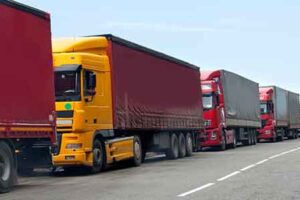The California Air Resources Board (CARB) is at the forefront of the battle against air pollution, and its latest initiative, the Clean Truck Check program, is a significant step toward cleaner air in the state. CARB, which stands for the California Air Resources Board, has introduced this program as a comprehensive Heavy-Duty Inspection and Maintenance (HD I/M) regulation to ensure that heavy-duty vehicles’ emissions control systems are functioning correctly when they traverse California’s roadways.
The Clean Truck Check program’s primary objective is to diminish the toxic air pollution stemming from commercial vehicles operating in California. To achieve this, the program combines periodic vehicle testing with emissions monitoring and strict enforcement measures, aiming to identify and rectify emissions-related issues promptly. The focus is not just on the vehicles themselves but also on the carriers, fleets, and drivers responsible for these vehicles, ensuring they adhere to the necessary repair and maintenance procedures.
CARB has always been driven by the need to reduce the environmental impact of combustion-powered commercial vehicles. These vehicles emit a variety of harmful air pollutants, including particulate matter, oxides of nitrogen, and greenhouse gases, all of which negatively affect public health. While California has made commendable progress in reducing air pollution, the Clean Truck Check program is another essential step toward further reducing emissions and helping the state reach its ambient air quality standards and climate goals.
California has set ambitious targets to combat air pollution and climate change, including:
Federal Air Quality Standards: Meeting federal health-based ambient air quality standards by 2023 and 2031.
Greenhouse Gas Reduction: Achieving a 40% reduction in greenhouse gases (GHG) by 2030, with an 80% reduction by 2050.
Petroleum Reduction: Reducing petroleum use by 50% by 2030.
These targets necessitate a transformative shift in various sectors, including transportation. Public agencies, private businesses, and individuals all play a significant role in achieving these goals.
The Need for Zero-Emission Technology:
Mobile sources powered by fossil fuels are major contributors to air pollution, including ozone, greenhouse gas emissions, fine particulate matter (PM2.5), and toxic diesel particulate matter. They account for a substantial portion of smog-forming nitrogen oxide (NOx) emissions in California, as well as a significant share of greenhouse gas emissions. The introduction of zero-emission vehicles, which produce no tailpipe emissions, offers a solution. These vehicles are more energy-efficient, reduce dependence on petroleum, and substantially lower GHG emissions compared to their diesel counterparts.
Key Details of CARB’s Clean Truck Check Program:
- Implementation and Enforcement: The program was officially adopted on December 9, 2022, and enforcement is scheduled to commence in January 2024.
- Covered Vehicles: This regulation applies to nearly all diesel and alternative fuel vehicles weighing over 14,000 pounds, including personal vehicles, operating in California. Compliance is mandatory.
- Ensuring Compliance: As of January 1, 2020, commercial vehicles not in compliance with CARB’s regulations will be unable to register their vehicles with the California Department of Motor Vehicles (DMV).
Here are several steps to ensure compliance with CARB’s Clean Truck Check program:
- Maintenance: Regularly maintain your fleet’s heavy-duty vehicles to keep their emissions controls in optimal working condition. Any identified issues with a vehicle’s emissions controls should be addressed and repaired swiftly.
- Predictive Maintenance: Employ predictive maintenance solutions, such as Zonar FaultIQ®, to track and receive notifications of emissions faults that could lead to CARB inspection failures.
- Documentation: Ensure that your drivers can easily access proof of successful testing during roadside inspections.
- Response to Notices: If CARB notifies you that a vehicle’s test results indicate emissions beyond acceptable limits, submit a passing test result to CARB within 30 days of the notice.
- Annual Inspections: Continue conducting annual inspections for vehicles subject to the Periodic Smoke Inspection Program (PSIP).
Truck Electrification Possibilities:
Electric drivetrains are most suitable for congested urban areas with stop-and-go driving. Battery-electric and fuel-cell electric trucks, buses, and vans are already in use for local operations with predictable daily routes.
Commercially Available Zero-Emission Trucks:
Over 70 models of zero-emission vans, trucks, and buses are available from various manufacturers. Many of these vehicles are well-suited for operations with daily ranges of less than 100 miles. Major truck manufacturers are also gearing up to introduce market-ready zero-emission trucks.
Charging Costs:
The cost of charging a battery electric truck depends on charging speed, utility rates, and time of day. Calculators are available to estimate electricity costs, and some fleet owners can offset these costs through low carbon fuel standard credits in California.
Affordability of Zero-Emission Trucks:
While zero-emission trucks have higher upfront costs, their lower operating costs can make them cost-competitive with conventional trucks for specific duty cycles. As battery prices drop and technology improves, total ownership costs are expected to become even more favorable. Various incentives are currently available to offset the initial capital costs and infrastructure expenses.
Incentives for Zero-Emission Trucks:
Numerous funding programs, both at the state and federal levels, offer support for adopting advanced technologies. Programs like the Hybrid and Zero-Emission Truck and Bus Voucher Incentive Project provide rebates to offset upfront costs.
For veteran fleet managers, embracing zero-emission technology is not just a step toward regulatory compliance; it’s a significant opportunity to reduce operating costs, support cleaner air, and contribute to California’s environmental goals.
Zonar, a smart fleet solutions provider, offers support for California fleets by providing CARB-validated testing and accessible results during roadside inspections. Their dedicated in-house team of safety and compliance experts can assist you in navigating this new regulation and guide you on ensuring your fleet complies.
Furthermore, it’s advisable to consult with Zonar regarding compliance with California’s new Electronic Logging Device (ELD) mandate, which will also begin enforcement in January 2024. While engaging with Zonar, explore their vehicle health solutions that can help maintain your fleet in peak operating condition efficiently.







